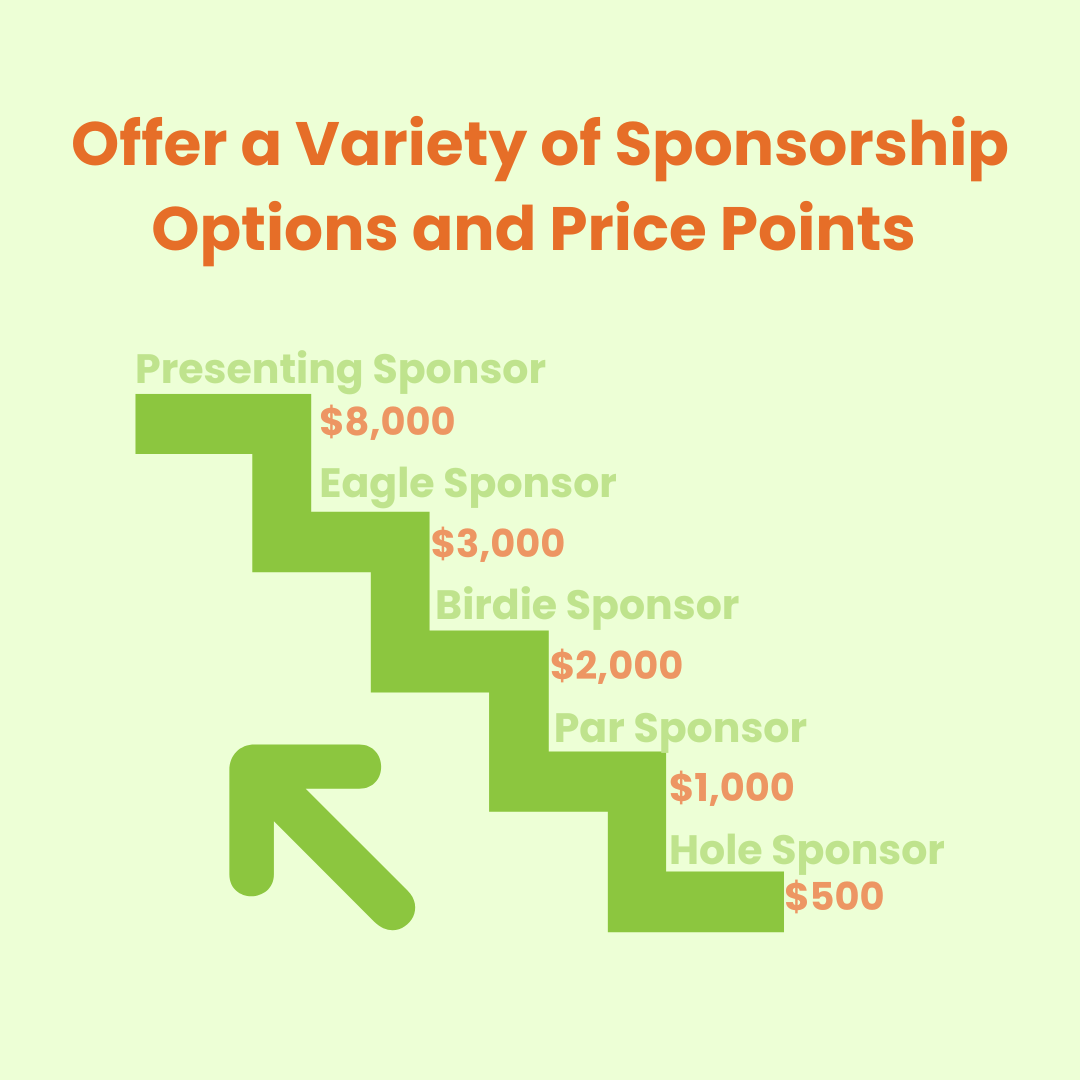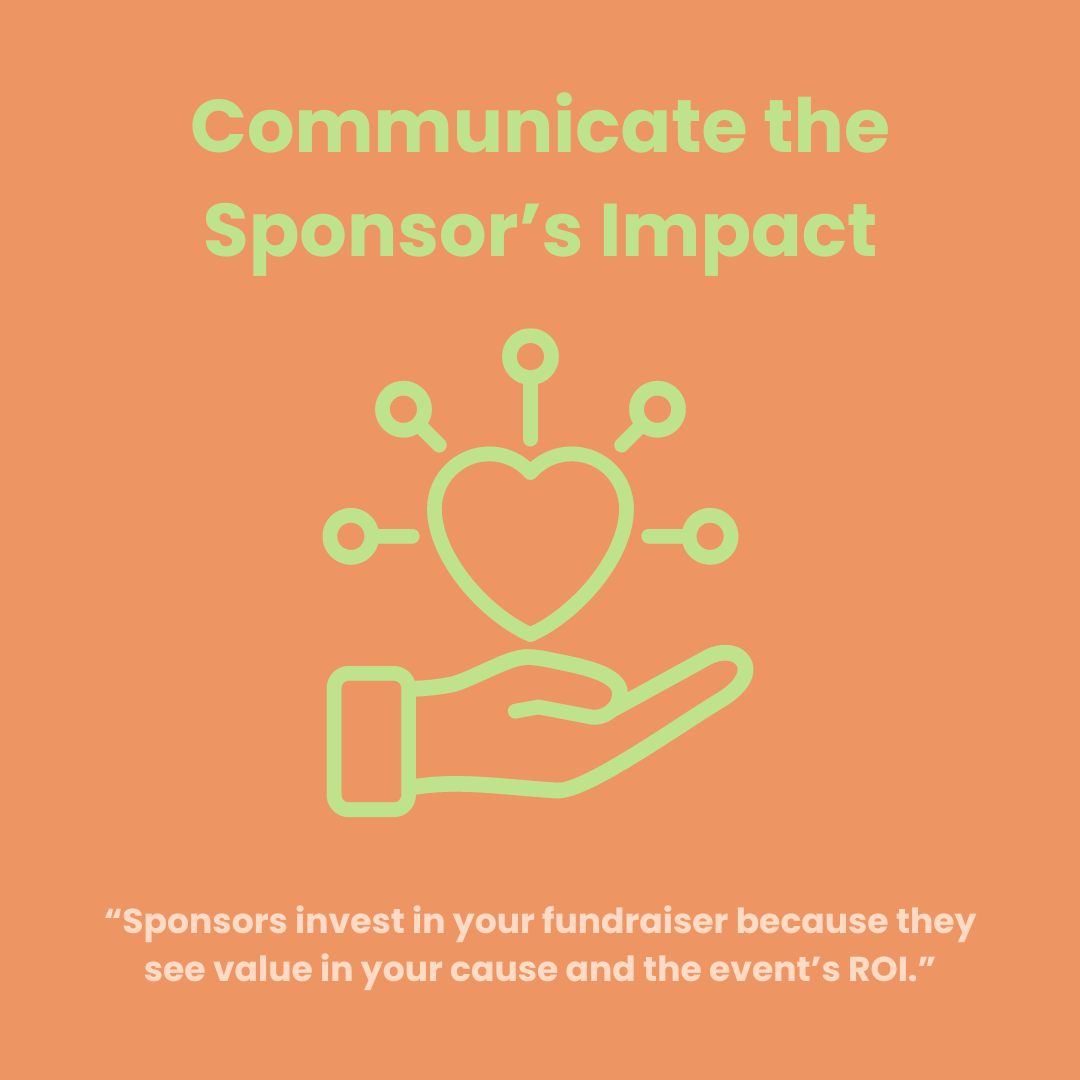4 Tips to Elevate Your Next Fundraising Event’s Sponsorships

The importance of sponsors for nonprofit fundraising events can’t be overstated. Sponsors not only bring in a significant portion of the event’s revenue, but they help broaden your network of supporters and lay the foundation for corporate partnerships.
Whether you’re using event sponsors to provide funding, in-kind donations, or both, they play a significant role in pushing your fundraiser over the finish line to achieve your goals. Follow these four tips to help make your next event’s sponsorship packages irresistible to businesses.
1. Offer a Variety of Sponsorship Options & Price Points
Providing options and choices allows companies of all types and sizes with various budgets and financial situations to take advantage of the opportunities afforded by your event.
Double the Donation suggests creating sponsorship tiers, with added benefits as the package’s value increases. Companies considering higher-value sponsorship packages get extra incentive to invest in your fundraising event. How might that look? Here are a handful of sample sponsorship tiers and packages for a nonprofit hosting a first-year charity golf tournament:
- Hole Sponsor | Price: $500. The sponsor’s name and logo appear on golf hole signage on one or more holes, plus digital exposure in the tournament’s live scoring app and the registration website.
- Par Sponsor | Price: $1,000. The sponsor’s name and logo appear on the registration website, signage recognizing all sponsors, and the opportunity to set up a booth on a tee box to interact with golfers.
- Birdie Sponsor | Price: $2,000. Includes the same benefits as the Par Sponsor, plus their logo appears on player gift bags and they have the option to speak at the awards ceremony.
- Eagle Sponsor | Price: $3,000. Includes the same benefits as the Par Sponsor, plus their logo appears on all golf carts and boxed lunches and they have the option to speak at the awards ceremony.
- Presenting Sponsor | Price: $8,000. Includes the same benefits as the Par Sponsor, plus their logo is featured throughout the golf event management platform as the technology sponsor, an on-course game is named after the sponsor, and they have the option to speak at the kickoff of the tournament.
Of course, you know your nonprofit best and what your audience of potential sponsors would respond to, so tailor your packages accordingly. Is logo exposure important? Or is the chance to mingle and engage with golfers more appealing? Your tiers may look different depending on the type of your event and the needs of your nonprofit.
2. Create a Custom Sponsorship Pitch
Start by conducting research into prospective sponsors, finding out more about details such as their process for accepting sponsorship proposals, their marketing or charitable budgets, other nonprofits they support, and any current philanthropic or corporate social responsibility initiatives. This will help you and your team gain a better understanding about what will make them say “yes” to sponsoring your fundraising event.
Your sponsorship pitch should be customized to each sponsor and fine-tuned to explain the ROI the business can expect from the partnership. Be sure to highlight these elements in your custom pitch:
- Sponsorship Details. Include complete information about the sponsorship package you’re pitching, as well as one or two others they might also be interested in. Detail the benefits they’ll receive and ask for feedback on whether or not that meets their goals.
- Competitor Activity. If one or more of the business’ competitors have come on board as sponsors for your current event or for past events, bring it up to create a sense of urgency.
- Attendee Demographics. Outline who you expect to participate in or attend the event. Continuing with the golf tournament example, explain how golfers typically represent an affluent demographic and sponsoring your event is a unique opportunity to reach these potential clients and customers through an activity they enjoy.
- Success Stories. If yours is an existing event, use data, testimonials, and stories to communicate how other businesses have benefited from supporting your event in the past. If yours is a first-year event, highlight how their support will help make an impact in your work and your community.
- Sample Marketing Activities and Materials. Share how the business can fold your event into their existing marketing strategies. Create mockup event marketing collateral they could use on their digital channels to spread the word about their involvement in your event.
How you present the pitch might depend on any existing relationships or connections you have with the sponsor. If you have an “in” and are planning to pitch a top-tier sponsorship, an in-person conversation might work best. If it’s a cold call, you might start with an email to help you identify the proper person at the business to have a further conversation.
3. Be Flexible & Creative With Your Sponsorships
While it’s definitely a good idea to present businesses with a variety of sponsorship options, don’t be afraid to get creative and offer some flexibility to help both your nonprofit and the prospective sponsor meet goals.
This might include modifying existing packages based on the sponsor’s interests and budget. For example, perhaps a potential sponsor is interested in the benefits included in the Par Sponsor from the above charity golf tournament example, but would like to add additional value with branded event marketing collateral, including mentions in a blog post and social media collaboration. In this case, consider creating a custom sponsorship package at a slightly higher price point, such as $1,250 or $1,500, to reflect the additional sponsor benefits. Or perhaps you have a partner who is willing to donate branded merchandise for each golfer in lieu of a financial contribution. You could create a Swag Sponsorship specifically for this partner and recognize them as such.
The key here is listening to your sponsors and what they’re interested in receiving in exchange for their support. After all, you want to provide the biggest win-win possible for your organization, the event, and the sponsor.
4. Communicate the Sponsor’s Impact
Sponsors invest in your fundraiser because they see the value in your cause and the event’s ROI. By providing their dollars or in-kind support, the sponsor has fulfilled their promise—so be sure to show them how you fulfilled yours.
It’s a good idea to send a report to each sponsor after your event to detail exactly how you met each deliverable promised in their sponsorship package. It’s another opportunity to engage with them following the event to set the stage for future support.
Include these elements in your report:
- Event Summary. Share appropriate information that paints a picture of your event, such as the number of attendees, sponsors, and volunteers. Include demographics, if you have them, to give the sponsor a better understanding of who your event attracts.
- Event Impact. Share the overall dollars raised and what those will enable your organization to do, in tangible terms whenever possible.
- Testimonials. Include any quotes from attendees, beneficiaries, sponsors, volunteers, or others.
- Deliverables. List each sponsor benefit and detail how you delivered on it. If for some reason you didn’t meet one or more deliverables, explain why to ensure transparency.
- Visuals. Include photos where the sponsor was showcased and where their logo was featured. Add screenshots and links, when appropriate.
Final Thoughts
As you begin your sponsor outreach, consider how you can make it easy for sponsors to get involved in your event, eliminating complex processes and time-consuming back and forth. You may want to implement an event management platform that caters to the type of event you’re holding, such as a golf-specific event software. Consider creating an event microsite where sponsors can see available packages, view sponsors that have already committed to the event, purchase their sponsorship, and upload assets with just a few clicks.
Guest Author:
Logan Foote, Sales and Education Manager at GolfStatus
Logan Foote has been around the game of golf nearly his entire life. He fi rst picked up a club at the age of four, and despite thousands of attempts, he’s never had a hole-in-one. He earned a bachelor’s degree in business administration at the University of Nebraska-Lincoln and pursued a career in sales. Logan came to GolfStatus in 2017, where he channels his passion for golf to help nonprofits raise money through the game. As Sales and Education Manager, Logan oversees a team that works with thousands of nonprofit clients to maximize their golf fundraisers with the GolfStatus platform, and shares his golf fundraising expertise through GolfStatus’s free educational webinars. He lives and golfs in Lincoln, Nebraska with his wife and three sons.
rst picked up a club at the age of four, and despite thousands of attempts, he’s never had a hole-in-one. He earned a bachelor’s degree in business administration at the University of Nebraska-Lincoln and pursued a career in sales. Logan came to GolfStatus in 2017, where he channels his passion for golf to help nonprofits raise money through the game. As Sales and Education Manager, Logan oversees a team that works with thousands of nonprofit clients to maximize their golf fundraisers with the GolfStatus platform, and shares his golf fundraising expertise through GolfStatus’s free educational webinars. He lives and golfs in Lincoln, Nebraska with his wife and three sons.
